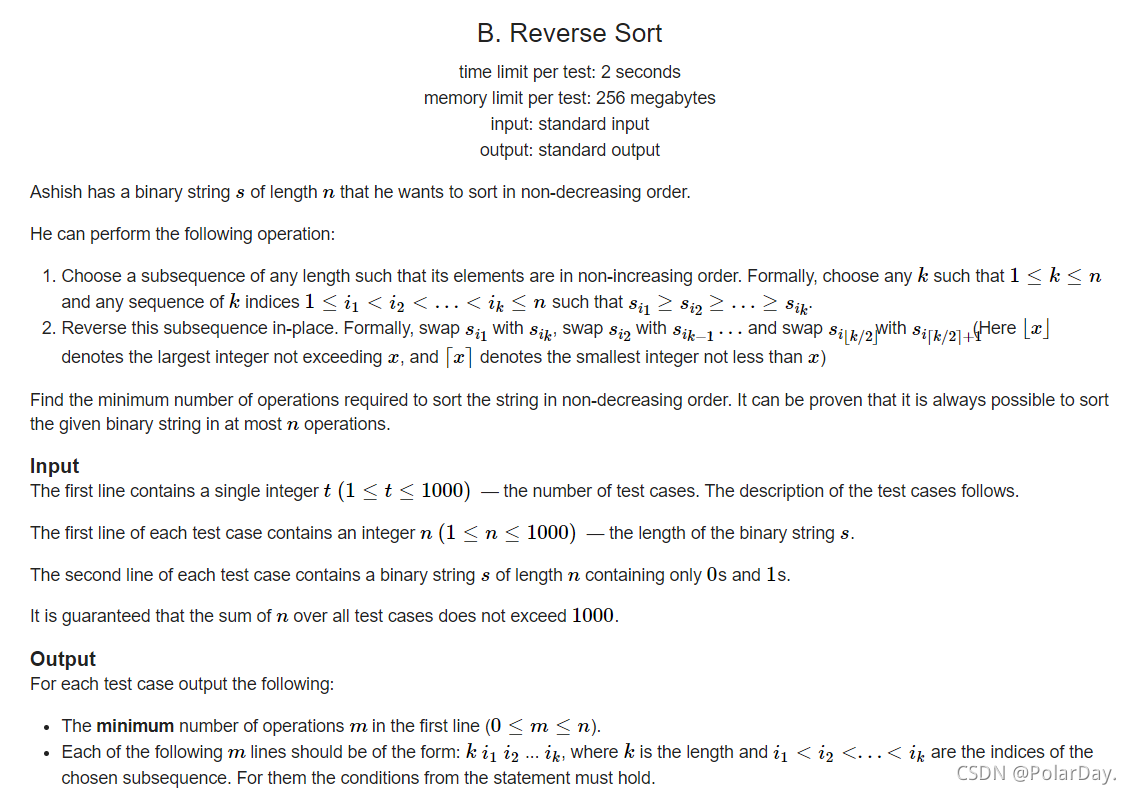点击阅读更多查看文章内容
B. Reverse Sort
第一次打codeforces,就做了一道签到题,这道题在看的时候以为挺简单的,看到好多人都出来了,自己想了好久也没做出来,还是看了大佬的解法才有的思路,我还是太菜了。
题目:

大概意思就是给一个01字符串,每次操作可以从中选一个子串做一个翻转然后放回原来的位置,问最小经过几次操作可以让字符串变为非递减的字符串(0都在1的前面)
分析
总可以通过一次操作解决
(太妙了,当时没想到,我是废物)
我们可以对字符串的0,1进行一个统计,总可以找到一个位置,使得这个位置之前的1的数目等于这个位置之后的0的数目。
例如:101丨00,我们可以从竖线处分开,竖线前的1等于竖线后的0,我们只需要把前面的1和后面的0翻转位置,即可得到非递减的字符串。
为什么我们一定能找到这样一个位置呢?
我们假设一个位置,在此位置前面的1的数目大于后面的0的数目,那么我们只要把当前位置往前移,如果前面一个是1,那么前面1的数目会减少,后面0的数目不变,如果前面一个是0,那么后面0的数目会增加,前面1的数目不变,由此每向前移动一步,两者之间的差距会减一,当差距减到0的时候,即为要求的位置。
代码
先上我自己写的超复杂版
用两个vector分别记录
1.从前往后在当前点之前1的数目
2.从后往前在当前点之后0的数目
然后用flag标记有没有找到上述的位置
如果没有则已经有序,直接输出0即可
1
2
3
4
5
6
7
8
9
10
11
12
13
14
15
16
17
18
19
20
21
22
23
24
25
26
27
28
29
30
31
32
33
34
35
36
37
38
39
40
41
42
43
44
45
46
47
48
49
50
51
52
53
54
55
56
57
58
59
60
61
62
63
64
65
66
67
68
69
70
| #include <iostream>
#include <stack>
#include <math.h>
#include <vector>
using namespace std;
int main()
{
string s;
int n;
int T;
cin >> T;
while (T--)
{
cin >> n;
cin >> s;
vector<int> cnt1(n, 0);
vector<int> cnt0(n, 0);
int len = n;
int i;
bool flag = false;
for (i = 0; i < len; i++)
{
if (s[i] == '1')
{
if (i == 0)
cnt1[i] = 1;
else
cnt1[i] = cnt1[i - 1] + 1;
}
else if (i != 0)
cnt1[i] = cnt1[i - 1];
}
for (i = len - 1; i >= 0; i--)
{
if (s[i] == '0')
{
if (i == len - 1)
cnt0[i] = 1;
else
cnt0[i] = cnt0[i + 1] + 1;
}
else if (i != len - 1)
cnt0[i] = cnt0[i + 1];
}
for (i = 1; i < len; i++)
{
if (cnt1[i - 1] != 0 && cnt1[i - 1] == cnt0[i])
{
cout << 1 << endl;
flag = true;
cout << cnt1[i - 1] * 2 << " ";
for (int j = 0; j <= i - 1; j++)
{
if (s[j] == '1')
cout << j + 1 << " ";
}
for (int j = i; j < len; j++)
{
if (s[j] == '0')
cout << j + 1 << " ";
}
cout << endl;
break;
}
}
if (!flag)
cout << 0 << endl;
}
return 0;
}
|
再上一个大佬的超简单版
代码来源
1
2
3
4
5
6
7
8
9
10
11
12
13
14
15
16
17
18
19
| void solve()
{
int n;cin>>n;
char c[n+1]; cin>>c;
vector<int> v;
for(int i=0;i<n;i++)
{
if(count(c, c+i, '1') == 0) continue;
if(count(c, c+i, '1') == count(c+i, c+n, '0'))
{
cout<<1<<'\n'<<2*count(c, c+i, '1')<<" ";
for(int j=0;j<i;j++) if(c[j] == '1') cout<<j+1<<" ";
for(int j=i;j<n;j++) if(c[j] == '0') cout<<j+1<<" ";
cout<<'\n';
return;
}
}
cout<<0<<'\n';
}
|


